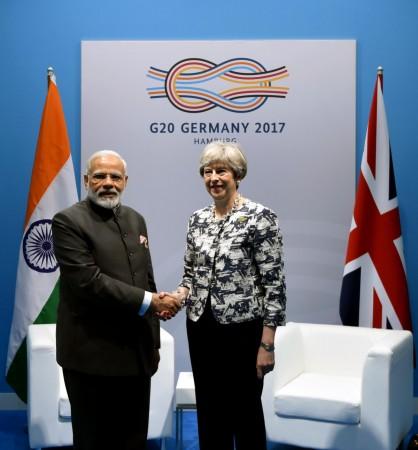
Even as India is petitioning the UK authorities to extradite fugitive liquor baron Vijay Mallya, who is currently hiding out in a mansion near London, the subject has been high on the agenda of the government at the G20 summit currently being held in Hamburg, Germany.
#G20Summit Partners in Growth- PM @narendramodi in conversation with @POTUS & @theresa_may ??????@MEAIndia @StateDept pic.twitter.com/AVykF0Mgbl
— India in USA (@IndianEmbassyUS) July 8, 2017
On Sunday, Prime Minister Narendra Modi stressed upon his British counterpart Theresa May to ensure the return of Vijay Mallya, and ensure the UK's cooperation to bring back economic offenders, according to a PTI report.
Both leaders also talked about the complete range of India-UK ties. In a tweet after the meeting, External Affairs Ministry spokesperson Gopal Baglay said the Prime Minister asked for UK's "cooperation for return of escaped Indian economic offenders", the PTI report stated.
Asked whether India seeking cooperation from the UK was limited to Mallya or whether Lalit Modi was also mentioned, PTI reported Baglay as telling reporters, "I don't want to get into the specifics but the phrase used in the tweet is escaped economic offenders and it is plural."
At its hearing on Saturday, Westminster Magistrates' Court in London fixed the trial date of Vijay Mallya's two-week extradition trial date for December 4 after hearing that all the evidence in the case has finally been received from the government of India and reviewed by the Crown Prosecution Service (CPS).
Chief magistrate Emma Arbuthnot demanded the CPS now pull the evidence, which runs into 2,000 pages, together and summarise it by the end of July.
In April, Mallya had attended a central London police station for his arrest and was released on conditional bail a few hours later after providing a bail bond worth 650,000 pounds, assuring the court of abiding by all conditions associated with extradition proceedings, such as the surrender of his passport and a ban on him possessing any travel documents.
India and the UK have an Extradition Treaty, signed in 1992, but so far only one extradition has taken place under the arrangement -- Samirbhai Vinubhai Patel, who was sent back to India last October to face trial in connection with his involvement in the post-Godhra riots of 2002.

















